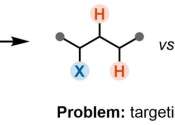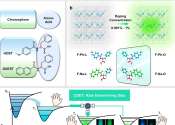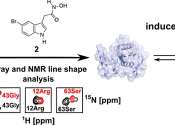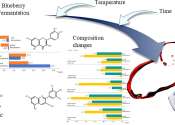Last update:
Biochemistry news

New device harnesses microwave flow reaction to convert biomass into useful sugars
Researchers at Kyushu University have developed a device that combines a catalyst and microwave flow reaction to efficiently convert complex polysaccharides into simple monosaccharides. The device utilizes a continuous-flow ...
Biochemistry
10 hours ago
0
27

Inexpensive ion-selective syringe electrodes can quantify potassium levels in food and pharmaceuticals
The intensive development of new technologies, especially in the field related to the construction of new portable devices used as sensors for the detection of many chemical compounds, has brought many surprising solutions. ...
Biochemistry
Jan 9, 2025
0
1

Chemists unlock potential of ketone and ester molecules, paving way for greener and more efficient drug development
Scientists have long considered ketones (a fundamental chemical class) and esters (molecules formed when an acid reacts with an alcohol) to be locked treasure chests of possibilities. Ubiquitous as pharmaceutical intermediates, ...
Biochemistry
Jan 9, 2025
0
59

Crafting the perfect bite of meat: Engineers develop metamaterials that mimic muscle and fat architecture
In a new publication in Nature Communications, Israeli and Palestinian engineers from The Hebrew University of Jerusalem pioneered the use of metamaterials to create whole cuts of meat. The work leverages cutting-edge materials ...
Biochemistry
Jan 8, 2025
0
136

Scientists uncover key step in how diazotrophs 'fix' nitrogen
Nitrogen is an essential component in the production of amino acids and nucleic acids—both necessary for cell growth and function. Although the atmosphere is composed of nearly 80% nitrogen, this nitrogen is in the form ...
Biochemistry
Jan 8, 2025
0
27

Polymer-based network gives artificial cells a life-like cytoskeleton
Just like your body has a skeleton, every cell in your body has a skeleton—a cytoskeleton to be precise. This provides cells with mechanical resilience, as well as assisting with cell division. To understand how real cells ...
Biochemistry
Jan 7, 2025
0
42

Fluorescent RNA complexes offer new insights into cellular dynamics
The specific labeling of RNA in living cells poses many challenges. In a new article published in the journal Nature Chemical Biology, researchers from the University of Innsbruck describe a structure-guided approach to the ...
Biochemistry
Jan 7, 2025
0
62

Scientists create vast library of compounds to target disease proteins
Over the past two decades, large genetic studies have linked tens of thousands of DNA variants to thousands of human traits and diseases. Yet, correcting the effects of those variants to treat disease has been hampered in ...
Biochemistry
Jan 6, 2025
0
61

Scientists identify 11 genes affected by PFAS, shedding light on neurotoxicity
Per- and polyfluorinated alkyl substances (PFAS) earn their "forever chemical" moniker by persisting in water, soil and even the human brain. This unique ability to cross the blood-brain barrier and accumulate in brain tissue ...
Biochemistry
Jan 6, 2025
0
256

Freely accessible database maps protein-lipid interactions for research and education
From combating cancer and infections to storing energy, lipid-protein interactions are critical to biological processes in cells. But the mechanisms that drive these interactions have historically been difficult to map and ...
Biochemistry
Jan 6, 2025
0
31

How a single nitrogen atom could transform the future of drug discovery
Researchers at the University of Oklahoma have developed a breakthrough method of adding a single nitrogen atom to molecules, unlocking new possibilities in drug research and development. Now published in the journal Science, ...
Biochemistry
Jan 6, 2025
0
138

Electron microscopy captures enzyme step in antibiotic production
Nonribosomal peptide synthetase (NRPS) enzymes are essential in creating important medications, such as penicillin and cyclosporine. This is done through a multi-step process where the enzymes activate amino acid building ...
Biochemistry
Jan 6, 2025
0
35

Virtual chemistry synthesizes 25 variations of a plant compound that could treat brain diseases
Among the hundreds of thousands of chemical compounds produced by plants, some may hold the key to treating human ailments and diseases. But recreating these complex, naturally occurring molecules in the lab often requires ...
Biochemistry
Jan 6, 2025
0
68

How do mosquito repellents work? A chemistry expert explains
It's summertime, and for many of us that means plenty of time outside—and, unfortunately, mosquitoes.
Biochemistry
Jan 6, 2025
1
1

Small milk fat globules promote growth of good bacteria, study reveals
A new study has unveiled fascinating insights into the complex relationship between milk fat globules and bacteria. The research, published in Food Chemistry, explores how the structural properties of these microscopic fat ...
Biochemistry
Jan 2, 2025
0
32

Deep neural networks enhance fragrance design with scent predictions
Researchers have explored the potential of deep neural networks (DNNs) in transforming fragrance design. By analyzing the sensing data of 180 essential oils, the DNN was trained using the odor descriptor data from 94 essential ...
Biochemistry
Jan 2, 2025
0
50

Microplastics found in multiple human organ tissues correlated with lesions
Research led by Zhejiang Agriculture and Forestry University in China has performed a metadata investigation into the presence of microplastics in humans. They report a concerning relationship between micro and nanoplastic ...

Enhanced Raman microscopy offers clearer chemical imaging of cryofixed samples
Understanding the behavior of the molecules and cells that make up our bodies is critical for the advancement of medicine. This has led to a continual push for clear images of what is happening beyond what the eye can see. ...
Biochemistry
Dec 24, 2024
0
77

Biosensors mimic human olfactory system to discriminate between very similar odors
The human olfactory system discriminates between thousands of odors by interacting specifically with olfactory receptors on sensory neurons. Each receptor can detect several odorants at different intensities, and the same ...
Biochemistry
Dec 20, 2024
0
3

Researchers highlight role 'workhorse protein' plays in keeping nervous system running smoothly
A team of researchers from the University of Massachusetts Amherst is the first to show how proteins called "chaperones" are vital in ensuring that neurons can transmit signals to one another. When this neurotransmission ...
Biochemistry
Dec 19, 2024
0
40
Other news

Plant hormones that help roots reach deeper water provide potential strategy for drought-resistant crops

Hydrogen peroxide and the mystery of fruit ripening: 'Signal messengers' in plants

Woodrats use 'quantity over quality' as a detox plan, study finds

Study reveals secrets behind cordierite's anomalous thermal expansion

Shallow waters and fast currents boost elkhorn coral restoration

Gene discovery reveals unique sex determination in killifish































































